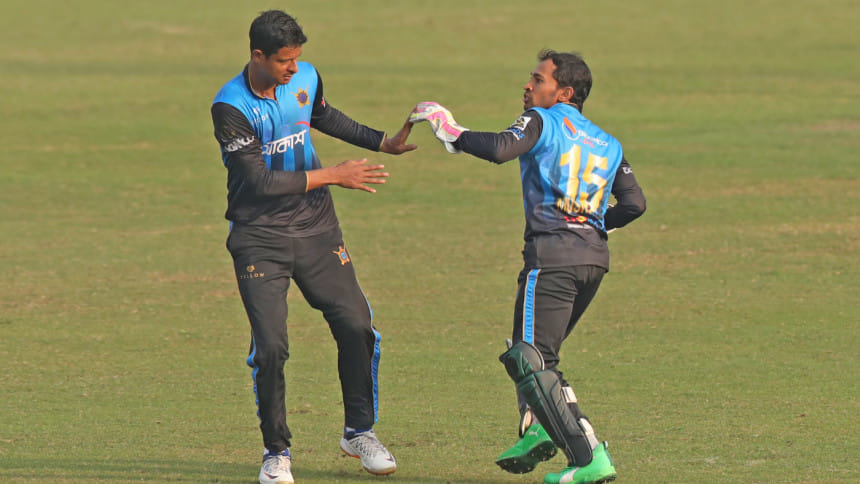When passion becomes bullying

On national television, a domestic cricketer had to flinch twice because his captain, a national superstar, threatened to hit him with the ball. Twice in the space of a few minutes. Not quite threatened, but the captain instinctively wound up to chuck the hard cricket ball at the hapless junior cricketer at point-blank range.
After the second incident, which resulted in the fall of a wicket, Nasum Ahmed -- the almost-victim of friendly fire -- cut an awkward figure in the huddle. Teammates were consoling him, and he put up a brave face, perhaps knowing that TV cameras were on him in the immediate aftermath of an exchange where he was basically bullied by his captain.
The identity of the captain would not be a surprise in light of the first two paragraphs. Who else but Mushfiqur Rahim would let emotions get the better of him? But even his history of on and off-field petulance would not have prepared watchers -- not to mention Nasum -- for the ugliness that unfolded today in the match between Beximco Dhaka and Fortune Barishal.
A few harsh words from the captain is par for the course in a tight game, but actual threat of violence, that too twice, has no place in a cricket match at any level.
Calm down, Rahim. Literally. What a chotu
(@imrickyb) pic.twitter.com/657O5eHzqn— Nikhil (@CricCrazyNIKS) December 14, 2020
In the first incident Nasum the bowler and Mushfiqur the wicketkeeper chased the ball and the former was in the way of a direct hit, so the captain decided to hit him instead. Almost, and for that perhaps we should be thankful.
The second incident involved the catch of Afif Hossain, who was threatening to steal the game from Beximco Dhaka. Afif scooped a ball straight to Nasum standing at short fine leg. He was shaping for the catch when Mushfiqur ran around 10 yards from his keeper's position, bumped into Nasum and completed the catch. Instead of celebrating a wicket, he once more shaped to hit Nasum with the ball, and Nasum flinched once more.
Now, it is received cricket wisdom that all things being equal, a catch should go to the wicketkeeper because he has the gloves and therefore a greater chance of pouching the ball. All things were not equal here -- the ball was going straight to Nasum. Yet, he was the one apologising to Mushfiqur, whose livid gesturing with his gloves indicated that the catch was his by right, no matter how much farther he was from the descending ball than Nasum.
It is also taught in cricket that whenever a ball goes up and two or more fielders can catch it, at least one should call for the ball. There was no call heard yesterday when Nasum was going for the catch. And, in light of the earlier incident, if Mushfiqur did call for the ball, you could bet your bottom paisa that Nasum would have run in the opposite direction Usain Bolt style.
But even if Nasum was wrong on both counts -- ignoring his captain's call and getting in the path of an easy catch -- it would not have justified Mushfiqur's reaction. After all, fans have been watching Mushfiqur for a long time, in many crunch situations, but his behaviour had never plumbed such depths. He had also been captain before, of the national team and various Bangladesh Premier League T20 sides.
What is different here?
Is it that in the national team there were other big players to rein him in, similar to BPL sides where Mushfiqur had foreign stars as teammates? Could Mushfiqur have done the same to a foreign player in the BPL? If the answer is no, what does that say about what he thinks of the country's domestic cricketers?
In the Bangabandhu T20 Cup, he is the biggest player by far in Beximco Dhaka. And throughout the group stages, Mushfiqur's tough love seemed to have spurred his teammates on. When it was do-or-die, however, he quite obviously bullied a lesser known player.
With the Bangabandhu T20 Cup being a purely Bangladeshi product, it is up to the Bangladesh Cricket Board to decide whether it wants to sanction Mushfiqur or at least ask him to apologise to Nasum. There is also the consideration of what behaviour the BCB wants superstars like Mushfiqur to model for youngsters.
With Dhaka set to play potentially two more do-or-die games, it would not be a surprise if such behaviour, if unchecked, continues.
This tournament has thrown up many positives -- not least the fact that a Bangladeshi product can be compelling, even without marquee foreign names. The BCB can add to that by ensuring that the standard of behaviour also aspires to international standards.

 For all latest news, follow The Daily Star's Google News channel.
For all latest news, follow The Daily Star's Google News channel. 



Comments